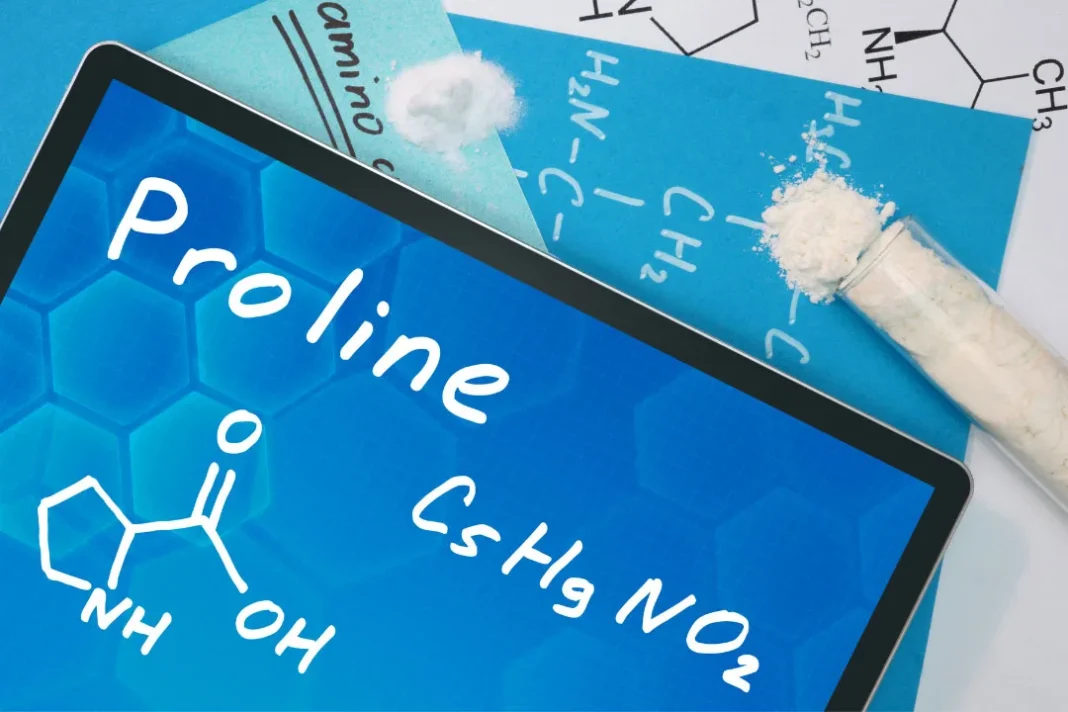L-proline, a non-essential amino acid, is a crucial part of collagen and plays a role in a number of bodily physiological functions. For those looking to improve alertness, attention, and cognition, this article will examine the nature of L-proline, its potential health advantages, ideal dosage, adverse effects, potential drug interactions, and optimum responsible use.
L-Proline (Collagen Amino Acid): Benefits, Dosage, Side Effects, Drug Interactions, And Other Important Information is an original (MedNewsPedia) article.
Nature of L-Proline
L-proline is a cyclic amino acid that can be found in collagen, elastin, keratin, and also among other proteins in the body. Proline is grouped as non-essential amino acid because it can be synthesized from glutamate from the reaction with the enzyme, pyrroline-5-carboxylate reductase, which is categorized non-essential amino acid.
L-Proline is crucial for maintaining the structure and function of connective tissues, such as skin, cartilage, and bones.

Health Benefits of L-Proline
1. The Production of Collagen and the Health of Connective Tissues: L-Proline plays a crucial part in the synthesis of collagen, an amino acid that is necessary for the development and maintenance of connective tissues like skin, cartilage, and bones. Hence, L-proline supports strong bones, joints, and skin.
2. Cognitive Function and Brain Health: Studies have indicated that L-Proline may be advantageous for both cognitive function and brain health. L-proline contributes to the synthesis of neurotransmitters like GABA, which are crucial for controlling anxiety, sleep, and mood. According toresearch, healthy adults who use L-proline supplements may have a better cognitive function and experience less stress.
3. Wound Healing: Collagen, which is crucial for wound healing, is produced in part by L-Proline. According to certain research, supplementing with L-proline may aid in the improvement of chronic wound healing.

Chemistry of L-Proline
L-Proline has a five-membered ring with an amino group and a carboxyl group as part of its chemical makeup. The unusual structure of L-Proline allows it to create stiff structures and stabilize protein structures. The hydrophilic amino acid, which attracts water molecules, is frequently present in the hydrophilic portions of proteins.
Physiological Mechanism of Action of L-Proline
L-proline has a role in the development and upkeep of connective tissues like collagen, elastin, and keratin among other physiological processes in the body.
According to research, L-proline may have advantages for mental health and cognition. According to one study, healthy adults who took supplements of L-proline performed better cognitively and were less stressed. L-proline may have neuroprotective benefits and enhance mouse spatial learning and memory, according to a different study.
Optimal Dosage of L-Proline
The best amount of L-proline to take depends on a person’s age, sex, weight, and general health. For adults, a daily L-proline consumption of between 2 and 10 grams is advised. On the other hand, nothing is known about the ideal L-proline dosage for various medical situations.
Side Effects of L-Proline
In most cases, L-proline is regarded as safe and well-tolerated when administered at the recommended dosage. L-Proline supplementation has no documented negative side effects that are of a significant nature. However, some people might experience minor side effects from consuming L-proline such as nausea, diarrhea, and stomach pain.
Potential Substance Interactions with L-Proline
Medications like tetracycline antibiotics and ACE inhibitors, as well as L-proline, may interact with one another. Supplements like creatine and L-arginine may potentially interact negatively with L-proline. To ensure safe and optimal use, it is crucial to speak with a healthcare practitioner before taking L-proline or any other supplements.
Best Responsible Use of L-Proline
L-Proline can be used as a supplement in addition to other nootropics to promote cognitive function and brain health for if you are looking to improve alertness, focus, and cognition. It’s crucial to utilize L-Proline sensibly and to speak with a doctor before doing so.
L-Proline, additional collagen amino acids, vitamins, and minerals are all included in myPEAK Radiance, a supplement sold by myPEAK Supplements that promote the health of the skin, hair, and nails. If you seek to improve your general health and well-being, the L-Proline supplement is a wonderful option.

L-Proline:
Conclusion
An incredibly beneficial amino acid that can assist with stress management is L-proline. In addition to easing anxiety and improving mood, these non-essential amino acids also improve sleep quality. L-proline is not an essential amino acid and hence the body can produce it by converting other amino acids into L-proline. MyPEAK Radiance supplement contains L-Proline and other minerals and vitamins, which when consumed, will work synergistically and promote mental well-being and wellness. Seek advice from your healthcare provider to avoid supplements that are antagonistic to L-proline.
Important Note: The information contained in this article is for general informational purposes only, and should not be construed as health or medical advice, nor is it intended to diagnose, prevent, treat, or cure any disease or health condition. Before embarking on any diet, fitness regimen, or program of nutritional supplementation, it is advisable to consult your healthcare professional in order to determine its safety and probable efficacy in terms of your individual state of health.
Regarding Nutritional Supplements Or Other Non-Prescription Health Products: If any nutritional supplements or other non-prescription health products are mentioned in the foregoing article, any claims or statements made about them have not been evaluated by the U.S. Food and Drug Administration, and such nutritional supplements or other health products are not intended to diagnose, treat, cure, or prevent any disease.


